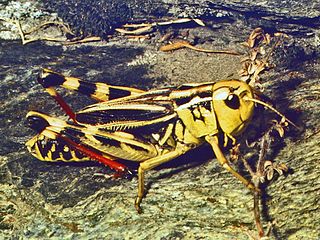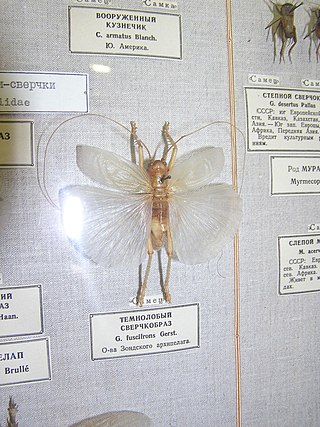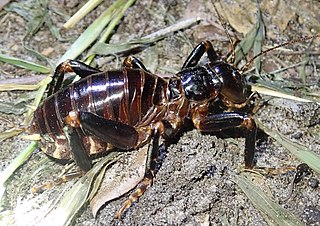
Insects in the family Tettigoniidae are commonly called katydids or bush crickets. They have previously been known as "long-horned grasshoppers". More than 8,000 species are known. Part of the suborder Ensifera, the Tettigoniidae are the only extant (living) family in the superfamily Tettigonioidea.

Bandwings, or band-winged grasshoppers, are the subfamily Oedipodinae of grasshoppers classified under the family Acrididae. They have a worldwide distribution and were originally elevated to full family status as the Oedipodidae. Many species primarily inhabit xeric weedy fields, and some are considered to be important locusts:

Stenopelmatidae is a family of large, mostly flightless orthopterans that includes the Jerusalem crickets. Two genera: Ammopelmatus and the type genus Stenopelmatus are found in the New World. Oryctopus and Sia are Old World genera, and previously placed in their own subfamilies, but with the addition of new genera, current placement is as five tribes in the single subfamily Stenopelmatinae.

The Phasmatidae are a family of the stick insects. They belong to the superfamily Anareolatae of suborder Verophasmatodea.

Schistocerca is a genus of grasshoppers, commonly called bird grasshoppers, many of which swarm as locusts. The best known species is probably the desert locust and trans-Atlantic flight may explain the biogeography of some locust species.

Trigonidiinae is a subfamily of insects in the order Orthoptera, suborder Ensifera, based on the type genus Trigonidium. They are often referred to as sword-tail crickets, winged bush crickets or trigs.

Arcyptera is a genus of grasshoppers belonging to the family Acrididae subfamily Gomphocerinae. These grasshoppers are present in mainland Europe, and in the eastern Palearctic realm through to northeastern Asia.

Mecopodinae are a subfamily of bush crickets found in western South America, sub-Saharan Africa, and Asia. In Asia, the distribution includes India, Indochina, Japan, the Philippines, and Malesia to Papua New Guinea and Australasia, including many Pacific islands.

Oxyini is one of two tribes of grasshoppers in the subfamily Oxyinae. Some genera previously listed here are now placed in the subfamilies Caryandinae and Hemiacridinae.
The Pseudotettigoniinae are an extinct subfamily of the Tettigoniidae.

Tettigoniidea is an infraorder of the order Orthoptera, with six extant families.
Hippopedon is a genus of band-winged grasshoppers in the family Acrididae. There are at least three described species in Hippopedon.
Tomonotus is a genus of band-winged grasshoppers in the family Acrididae. There are at least two described species in Tomonotus.

Leprus is a genus of band-winged grasshoppers in the family Acrididae. There are at least three described species in Leprus.

Orophus tessellatus, the false leaf katydid, is a species of katydid native to Mexico, Central America, and South America. It is in the large subfamily Phaneropterinae within the tribe Amblycoryphini. Its coloring varies from brown to green, some with spots, mottling, or uniform in coloration. The body length reaches 16 mm (0.63 in) in males and 22 mm (0.87 in) in females. The ovipositor is approximate 7 mm (0.28 in) in length. The species is characterized by the size of the forewings and their "dirty" coloring.

Gryllacris is a genus of Orthopterans, sometimes known as 'leaf-folding crickets' in the family Gryllacridinae. It is the type genus for the family, tribe Gryllacridini and its subfamily.

Arachnacris is an Asian genus of large bush crickets in the sub-family Mecopodinae and tribe Mecopodini. They are found in tropical forest areas of Malesia.

Stenopelmatinae is the sole subfamily in the family Stenopelmatidae. There are about 7 genera and more than 50 described species in Stenopelmatinae.

Stauroderus is a genus of slant-faced grasshoppers in the family Acrididae. There are three described species in Stauroderus, found in the Palearctic realm.

Pachytrachis is a genus of Palaearctic bush crickets in the tribe Platycleidini, erected by Boris Uvarov in 1940. Species have been recorded from Italy, through South-eastern Europe to Turkey.

















